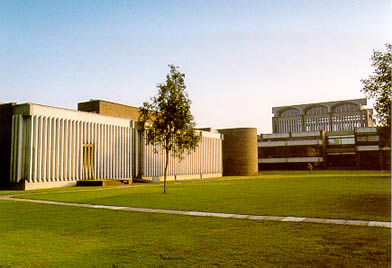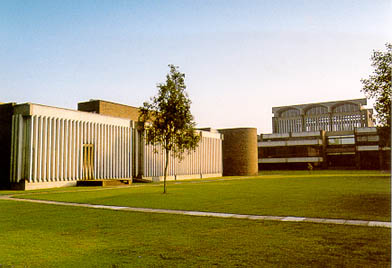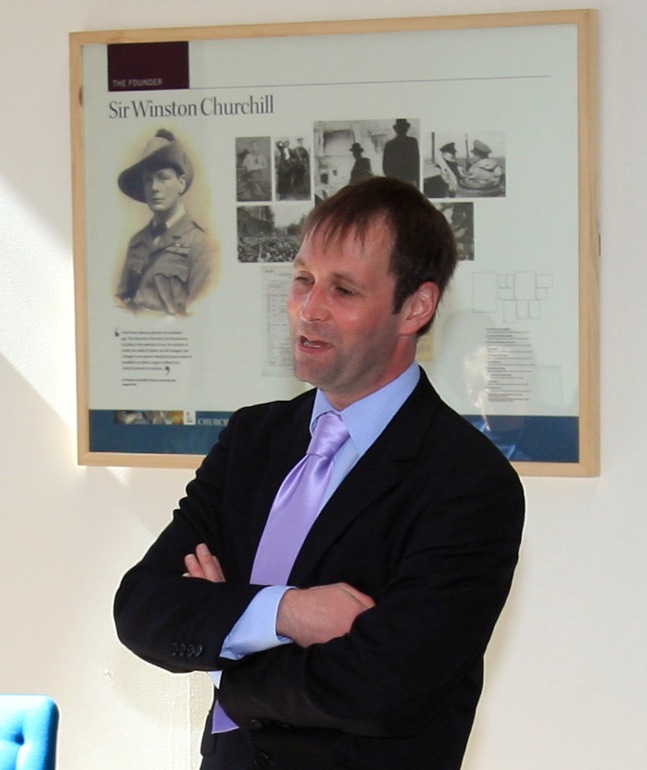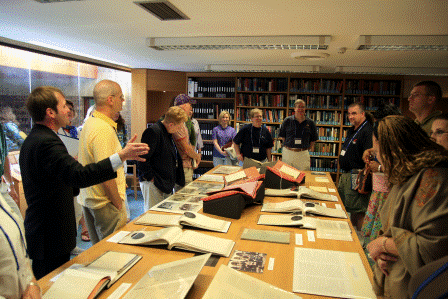
Uncategorized
Research: Primary Documents and the Churchill Archives Centre

Churchill College, Cambridge
October 28, 2009
The Churchill Archives Centre will house the Institute for its first two weeks, providing a seminar room in addition to access to its archives. One of the  largest repositories in the United Kingdom for modern personal papers, the Centre houses the archives of Sir Winston Churchill, Baroness (Margaret) Thatcher, and many of their great contemporaries. It collects documents in the fields of politics, grand strategy, international relations, and science and technology. (An overview of the Churchill Archives Centre and its collections is available on the Centre’s web pages at http://www.chu.cam.ac.uk/archives/.) The Churchill Papers alone fill two and a half thousand boxes, containing an estimated one million items.
largest repositories in the United Kingdom for modern personal papers, the Centre houses the archives of Sir Winston Churchill, Baroness (Margaret) Thatcher, and many of their great contemporaries. It collects documents in the fields of politics, grand strategy, international relations, and science and technology. (An overview of the Churchill Archives Centre and its collections is available on the Centre’s web pages at http://www.chu.cam.ac.uk/archives/.) The Churchill Papers alone fill two and a half thousand boxes, containing an estimated one million items.
The Archives Centre is located on the grounds of Churchill College, the national and Commonwealth memorial to Sir Winston and part of the University of Cambridge. It exists not just to preserve the unique collections in its care, but also to develop and support educational programs based on these primary resources. The Centre was built with the support of distinguished Americans, including several American Ambassadors to the Court of St. James’s, and in recent years has collaborated with American academic, cultural, and educational organizations.

2024 International Churchill Conference
 Allen Packwood, director of The Churchill Archives Centre and shown at right, in partnership with Professor Muller, will suggest, in advance of our arrival, areas of productive research, based on their knowledge of the Archives. As soon as the Institute roster is complete, an on-line Google Group will be established for easy and timely communication. Participants will have ample opportunity to review topics and query the directors in advance about resources on other themes of interest, allowing the 10-12 hours of actual research time to be used most efficiently. On-site, participants will have access to Archives computer stations and will be scheduled in groups of six to examine documents related to their own topic. They will meet Archives staff and guest lecturers to discuss their findings and to consider their value for their own teaching. Teachers will present short oral reports of their Archives experience at the end of their second week as scholars-in-residence.
Allen Packwood, director of The Churchill Archives Centre and shown at right, in partnership with Professor Muller, will suggest, in advance of our arrival, areas of productive research, based on their knowledge of the Archives. As soon as the Institute roster is complete, an on-line Google Group will be established for easy and timely communication. Participants will have ample opportunity to review topics and query the directors in advance about resources on other themes of interest, allowing the 10-12 hours of actual research time to be used most efficiently. On-site, participants will have access to Archives computer stations and will be scheduled in groups of six to examine documents related to their own topic. They will meet Archives staff and guest lecturers to discuss their findings and to consider their value for their own teaching. Teachers will present short oral reports of their Archives experience at the end of their second week as scholars-in-residence.
We do not assume that you have had any experience at all working in an historical archive. Upon completion of a short tutorial by Archives staff on our first day, teachers will be credentialed as readers and will be ready to engage part-time in their research projects. Following an introduction by the director, the Archives Staff will present a program on archival preservation and restoration, explaining the methods used for various types of documents: letters, me moranda, photographs, diaries, drafts of speeches, and so on. Staff will explain required procedures for handing various items, from white gloves to official bean bags to hold books open. The Archives will issue each participant an accreditation card, qualifying you to use the Archives for a three-year period. A second session, Introduction to Private Research, will detail the exact methods for retrieving documents, signing for them, complying with copyright regulations, and requesting photocopies. Participants will begin their research, using in turn the six seats (out of ten available) reserved for our Institute. Both Professor Muller and Director Packwood will be available to discuss, to recommend, and to support. From ten to twelve hours of research time will be available for each participant. Throughout, participants may read original documents and view microfilm as well as request photocopies of documents for later perusal.
moranda, photographs, diaries, drafts of speeches, and so on. Staff will explain required procedures for handing various items, from white gloves to official bean bags to hold books open. The Archives will issue each participant an accreditation card, qualifying you to use the Archives for a three-year period. A second session, Introduction to Private Research, will detail the exact methods for retrieving documents, signing for them, complying with copyright regulations, and requesting photocopies. Participants will begin their research, using in turn the six seats (out of ten available) reserved for our Institute. Both Professor Muller and Director Packwood will be available to discuss, to recommend, and to support. From ten to twelve hours of research time will be available for each participant. Throughout, participants may read original documents and view microfilm as well as request photocopies of documents for later perusal.
You will be given access to the collections held by the Churchill Archives Centre and also to the Centre’s library of related secondary literature, which will be available on overnight loan. You will be able to make copies of documents to study off-site and will be encouraged to work with Archives Centre staff on the production of subject-based document packs that can be used to support their teaching. Six laptops, reserved for our institute, may be loaned to participants who need them, on a rotating basis. A modest number of public computer terminals with full internet access are available within the College. You will also be able to use your own laptop computers within the College, using the wireless network. You may find bringing your own laptop, if you have one, very convenient if you are a regular user.
Participants will have a choice of final project. They may either submit a lesson plan, with documents, or an academic paper, whichever fits in better with their plans. It should be understood that the academic paper can be submitted to another university for credit, provided that the other university is willing to let the participant gain credit for a project originally written for the institute.
Subscribe
WANT MORE?
Get the Churchill Bulletin delivered to your inbox once a month.


